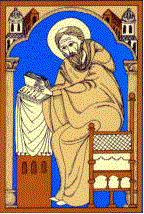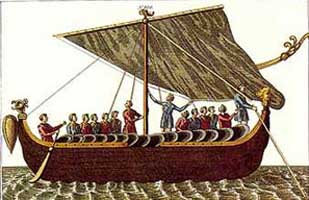|
There was in the monastery of this abbess a certain brother, marked in a special manner by the grace of God, for he was wont to make songs of piety and religion, so that whatever was expounded to him out of Scripture, he turned ere long into verse expressive of much sweetness and penitence, in English, which was his native language. By his songs the minds of many were often fired with contempt of the world, and desire of the heavenly life. Others of the English nation after him attempted to compose religious poems, but none could equal him, for he did not learn the art of poetry from men, neither was he taught by man, but by God's grace he received the free gift of song, for which reason he never could compose any trivial or vain poem, but only those which concern religion it behoved his religious tongue to utter. For having lived in the secular habit till he was well advanced in years, he had never learned anything of versifying; and for this reason sometimes at a banquet, when it was agreed to make merry by singing in turn, if he saw the harp come towards him, he would rise up from table and go out and return home.
Once having done so and gone out of the house where the banquet was, to the stable, where he had to take care of the cattle that night, he there composed himself to rest at the proper time. Thereupon one stood by him in his sleep, and saluting him, and calling him by his name, said, "Caedmon, sing me something." But he answered, "I cannot sing, and for this cause I left the banquet and retired hither, because I could not sing." Then he who talked to him replied, "Nevertheless thou must needs sing to me." "What must I sing?" he asked. "Sing the beginning of creation," said the other. Having received this answer he straightway began to sing verses to the praise of God the Creator, which he had never heard, the purport whereof was after this manner: "Now must we praise the Maker of the heavenly kingdom, the power of the Creator and His counsel, the deeds of the Father of glory. How He, being the eternal God, became the Author of all wondrous works, Who being the Almighty Guardian of the human race, first created heaven for the sons of men to be the covering of their dwelling place, and next the earth." This is the sense but not the order of the words as he sang them in his sleep; for verses, though never so well composed, cannot be literally translated out of one language into another without loss of their beauty and loftiness. Awaking from his sleep, he remembered all that he had sung in his dream, and soon added more after,t he same manner, in words which worthily expressed the praise of God.
In the morning he came to the reeve who was over him, and having told him of the gift he had received, was conducted to the abbess, and bidden, in the presence of many learned men, to tell his dream, and repeat the verses, that they might all examine and give their judgement upon the nature and origin of the gift whereof he spoke. And they all judged that heavenly grace had been granted to him by the Lord. They expounded to him a passage of sacred history or doctrine, enjoining upon him, if he could, to put it into verse. Having undertaken this task, he went away, and returning the next morning, gave them the passage he had been bidden to translate, rendered in most excellent verse. Whereupon the abbess, joyfully recognizing the grace of God in the man, instructed him to quit the secular habit, and take upon him monastic vows; and having received him into the monastery, she and all her people admitted him to the company of the brethren, and ordered that he should be taught the whole course of sacred history. So he, giving ear to all that he could learn, and bearing it in mind, and as it were ruminating, like a clean animal,2 turned it into most harmonious verse; and sweetly singing it, made his masters in their turn his hearers. He sang the creation of the world, the origin of man, and all the history of Genesis, the departure of the children of Israel out of Egypt, their entrance into the promised land, and many other histories from Holy Scripture; the Incarnation, Passion, Resurrection of our Lord, and His Ascension into heaven; the coming of the Holy Ghost, and the teaching of the Apostles; likewise he made many songs concerning the terror of future judgement, the horror of the pains of hell, and the joys of heaven; besides many more about the blessings and the judgements of God, by all of which he endeavoured to draw men away from the love of sin, and to excite in them devotion to well-doing and perseverance therein. For he was a very religious man, humbly submissive to the discipline of monastic rule, but inflamed with fervent zeal against those who chose to do otherwise; for which reason he made a fair ending of his life.
For when the hour of his departure drew near, it was preceded by a bodily infirmity under which he laboured for the space of fourteen days, yet it was of so mild a nature that he could talk and go about the whole time. In his neighbourhood was the house to which those that were sick, and like to die, were wont to be carried. He desired the person that ministered to him, as the evening came on of the night in which he was to depart this life, to make ready a place there for him to take his rest. The man, wondering why he should desire it, because there was as yet no sign of his approaching death, nevertheless did his bidding. When they had lain down there, and had been conversing happily and pleasantly for some time with those that were in the house before, and it was now past midnight, he asked them, whether they had the Eucharist within?They answered, "What need of the Eucharist? for you are not yet appointed to die, since you talk so merrily with us, as if you were in good health." "Nevertheless," said he, "bring me the Eucharist." Having received It into his hand, he asked, whether they were all in charity with him, and had no complaint against him, nor any quarrel or grudge. They answered, that they were all in perfect charity with him, and free from all anger; and in their turn they asked him to be of the same mind towards them. He answered at once, "I am in charity, my children, with all the servants of God." Then strengthening himself with the heavenly Viaticum, he prepared for the entrance into another life, and asked how near the time was when the brothers should be awakened to sing the nightly praises of the Lord?They answered, "It is not far off." Then he said, "It is well, let us await that hour;" and signing himself with the sign of the Holy Cross, he laid his head on the pillow, and falling into a slumber for a little while, so ended his life in silence.
Thus it came to pass, that as he had served the Lord with a simple and pure mind, and quiet devotion, so he now departed to behold His Presence, leaving the world by a quiet death; and that tongue, which had uttered so many wholesome words in praise of the Creator, spake its last words also in His praise, while he signed himself with the Cross, and commended his spirit into His hands; and by what has been here said, he seems to have had foreknowledge of his death.
|


